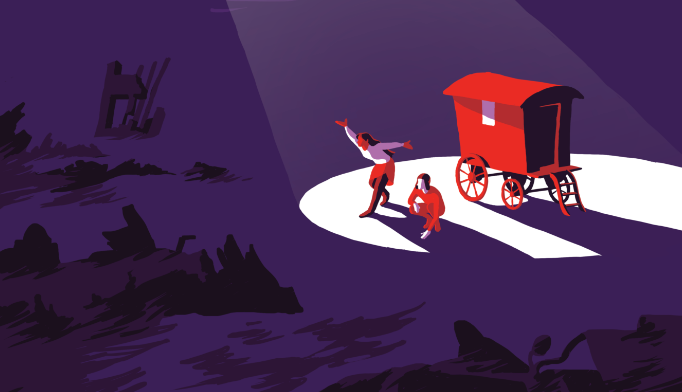Georgetown University’s production of Dog Act dauntlessly defies the notion that the end of the world has to be a melancholic matter. Running in the Davis Performing Arts Center’s Devine Theatre from Nov. 2 to Nov. 12, this play is a must-see on-campus student theater event this fall.
Written by Liz Duffy Adams, the two-act, two hour-long play tells the tale of a traveling vaudeville troupe in a post-apocalyptic North America, a synopsis that, from the onset, may sound quite familiar to the best-selling novel Station Eleven (2014) by Emily St. John Mendel. However, here in Adams’ universe, the seasons change without warning, and society’s crumble is never fully explained. Despite finding themselves in a bleak setting where every piece of rubble serves as a reminder of the normalcy lost forever in the past, Rozetta “Zetta” Stone (Anna Dewey (COL ’26)) and her best friend Dog (Jake Teall (COL ’23)) are propelled forward by the possibility of a sunnier future just beyond the horizon. Dog Act explores the “now what?” of the end of the world, paying special attention to the quieter, in-between moments of nomadic life and the wholesome companionship that can arise from simply surviving together.
Plot wise, the first act mostly mirrors the actions of its characters in its lackadaisical meandering—a decent portion of the first hour features Zetta and Dog engaging in casual campsite conversation. During these chats, the two pals discuss plans for the future, in terms of their act and their travels, among other musings (sometimes of the musical variety). Though simplistic and slow-moving, this beginning is anything but boring. In actuality, like any good cup of tea, allowing this story ample time to steep is entirely necessary to ensure the audience is able to savor the remainder of this flavorful tale to its fullest extent. As Dog Act immerses the audience into its barren wasteland while simultaneously introducing its contrastingly vibrant inhabitants, Dewey and Teall’s fantastic performances make the time pass easily.
It is important to clarify that despite his name and his simulated canine behaviors, Dog is not an actual dog—he is a human just like the rest of the characters. Though Rozetta is happy to play along with his “dog act” for the sake of not pushing him away with persistent questioning, throughout the play the viewer is left wondering why Dog has chosen to renounce his humanity in favor of living life pretending to be an animal. Portraying Dog’s hauntedness, tenderness, and timidity in one fell swoop was undoubtedly a difficult feat, but the character could not have been in better hands. Teall finds a way to capture the depth of Dog’s character even with a single wordless glance; his facial expressions were on-point from start to finish.
Dog’s gloomier disposition is refreshingly contrasted by Zetta’s beaming positivity. Dewey shows the duality of Zetta’s wide-eyed, bushy-tailed optimism and her quiet, commanding strength with confident ease. The epitome of heart and natural charisma, Dewey is a tremendous talent who truly sets the tone of the production from the onset.
As Zetta and Dog continue traveling, they ultimately come into contact with Vera (Camila Madero (COL ’24) and Jo-Jo (Angelina Dressel (COL ’26)), another group of vagabond vaudevillians. Like Dog, Vera’s motivations are concealed when the play begins. Her mystery is handled with tactful timing; while the majority of her unraveling is saved for the second act, the first act plants just enough seeds to keep the audience wanting more while never making the big reveal feel too obvious.
The beginning of the play also familiarizes us with the modernized, Shakespearean musicality of Adams’ eccentric script. The language she employs is unapologetically frivolous, careening from the actors’ tongues before bouncing off of the walls of the theater. While at times the cleverly layered witticisms woven into the dialogue can make the plot a bit harder to follow, the script is quite pleasing to the ear and a joy to unpack—the fact that the script demands the listener’s full attention at all times is impressive rather than a drawback.
Once the first hour has laid this crucial groundwork, the second act roars to life, amping up the comedy and the character development. One emotionally charged scene in particular between Vera and Dog toward the beginning of the second act provides arguably the best moment from the entire show. The raw performances of Madero and Teall left everyone in the pin-drop silent theater hanging on every last word with bated breath. However, even amidst more solemn moments, Dog Act never allows itself to stray too far away from its slapstick core. Soon after this somber scene, Zetta, Dog, Vera, and Jo-Jo put on a show which serves as Dog Act’s comedic climax. This humorous endeavor was an absolute delight, prompting a cascade of giggles from everyone in the house.
From the stellar acting performances, to the impeccable set design, to the vivacious musical numbers, everyone involved in this production of Dog Act works in perfect harmony to bring this show to life.
While the overall set design is effective yet slightly basic in its transformation of the Devine theater into a grungy abandoned wasteland, the central set piece of Zetta and Dog’s traveling cart is incredible in its intricate attention to detail. The wheeled cart, adorned with a myriad of multi-colored knickknacks and musical instruments, juxtaposes against the dreary backdrop of the rest of the set perfectly, seamlessly mirroring the manner in which the larger-than-life personas of the main characters stand out against the lifeless world around them. However, what truly makes this jovially decorated set piece astounding is the fact that it is just as functional as it is fun to look at. In addition to its ability to unfurl into a stage (upon which the comedic show within a show from the second act is performed), the pianos, horns, and bells littered around its exterior are frequently used in Dog Act’s many musical interludes, adding to the makeshift charm of each number.
Though Dog Act describes itself as a play and not a musical, there is a decent amount of singing, as might be expected since the story orbits around a group of traveling performers. However, what makes the musical numbers in Dog Act feel so special is their organic nature. Instead of characters randomly bursting into song to explain the happenings of their lives as is often seen in musical theater, here, the characters sing in the context of practicing their acts for the road or simply passing the time while traveling. Rather than Broadway-style belting, the singing seen here is casual and communal, feeling more like a group of friends singing folk songs around a campfire than a deliberate, practiced performance. Particularly in the case of Zetta and Dog, singing provides a relief from the anxieties and boredoms of life on the road. Though the lyrics do not explicitly explain their life experiences, paying attention to the specific moments in which these songs are sung in an act of emotional unburdening provides telling glimpses into the internality of these dynamic characters, all the while entertaining the audience and allowing a brief reprieve from the verbose dialogue.
While Dog Act strategically samples elements from musical theater with great success, the show triumphs, first and foremost, within the comedic genre. Every single cast member in this compact ensemble showcases impeccable comedic timing; jokes landed organically without any uncomfortable strain. Jo-Jo, Vera’s partner both in crime and performance, is a particular stand out in this regard. Dressel’s dead-pan expressions during Jo-Jo’s morbid-yet-monotone story recitations never failed to make the audience erupt in laughter. Additionally, Ali Shahbaz (CSS ’23) and James Beit (MSB ’26) were unforgettable as the wild and wildly entertaining Coke and Bud, two rogue scavengers with an acute appreciation for a good f-bomb who stalk the main group of vaudevillians in hopes of raiding their supplies. Good chemistry is a necessity for any successfully funny buddy-cop-style storyline, and these two nailed it, bouncing off of one another’s energy perfectly.
Finally, as evidenced by all of the previously mentioned shining points, Holly Twyford’s direction was superb. Twyford is one of the most prolific actors in the D.C. area. most recently starring as the Stage Manager in Shakespeare Theatre’s production of Our Town earlier this year and Williamina Fleming in Silent Sky at Ford’s Theatre in 2020. In addition to her mile-long resume, Twyford is also a ten-time nominee and four-time winner of the Helen Hayes Award, an award that recognizes outstanding theatrical contributions within Washington D.C.
The energy and experience Twyford brings to this production is impeccable—she truly is the glue that brings all of these individually spectacular parts of the show together into one cohesive, marvelous final product. While evidence of her dazzling direction is littered throughout every part of the production, from the magnificent acting to the captivating musical performance, the stage direction she employs is uniquely excellent. Every portion of the stage is used effectively, allowing each section of the audience to get an up-close peek at the action. Additionally, the perpetual movement around the stage wordlessly and cleverly conveys the restlessness of these wandering characters.
All in all, even though midterm season is in full swing and finals are fast-approaching, take the time to see Dog Act while you still can! This whimsical, poignant, wonderfully wordy production, brought to life by an undeniably cast and crew, is definitely an event you wouldn’t want to miss—even if the world was ending.







